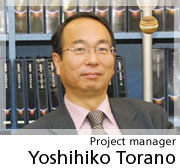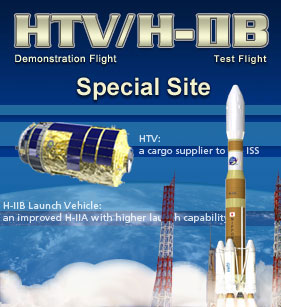 Amid great expectations and high hopes, the Japanese Experiment Module "Kibo" was attached to the International Space Station (ISS) in June 2008, opening the door to the station's future activities.
Amid great expectations and high hopes, the Japanese Experiment Module "Kibo" was attached to the International Space Station (ISS) in June 2008, opening the door to the station's future activities.To support subsequent ISS operations, JAXA is developing the logistic vehicle for the transportation of daily supplies, experimental equipment for the space environment, and devices for ISS maintenance such as an orbital replacement unit for the ISS's trajectory maintenance.
We are currently carrying out the development of the first flight model of the HTV to be launched in fiscal year 2009. Serial launches are planned to follow this annually.
Apart from the HTV, other means of transportation to the ISS will include the Space Shuttle, the Russian Progress and the European Automated Transfer Vehicle (ATV).
The Space Shuttle and the HTV have the same distinctive features in that both can carry inter-vehicular supplies (daily supplies and experiment equipment) and extra-vehicular supplies (the orbital replacement unit for the ISS and exposed experiment equipment – explosed pallet).
After the retirement of the Space Shuttle, which is scheduled for 2010, the HTV will be the only logistic carrier for the extra-vehicular supplies and large inter-vehicular experimental equipment. Expectations for the HTV have been increasing day by day.
Although the HTV is controlled and guided fully automatically duringits space journey, it is designed to be forcibly man controlled at certain points in space in line with ISS safety requirements. It cannot approach the ISS unless it receives commands from crewmembers on the ground or on the ISS.
The HTV is designed to satisfy the strict requirements related to the safety of manned spaceships and is equipped with basic functions for future manned spaceships.
The technologies cultivated through the HTV may apply to Lunar explorations or other interplanetary flights regardless of whether there are manned or unmanned (fully automated) flights in the future. The HTV will support future space activities of Japan and the rest of the world .
(June 26, 2008 Updated.)

